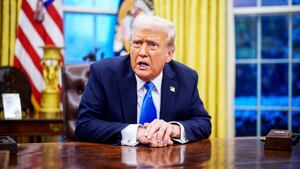A federal judge has ruled that President Donald Trump’s firing of a federal workforce watchdog was illegal, paving the way for a potential Supreme Court battle over Trump’s attempt to reshape the executive branch in his image.
U.S. District Judge Amy Berman Jackson ruled that Hampton Dellinger, head of the Office of Special Counsel, can continue to serve his five-year term, overruling Trump’s attempted firing, which was done via email.
Last month, Trump attempted to fire Dellinger in a one-sentence email, despite the fact that his term is fixed at five years unless he is removed for “inefficiency, neglect of duty, or malfeasance in office.”
Lawyers for the Trump administration have argued that Trump has the power to remove Dellinger without cause, arguing that a 1978 statute passed by Congress after the Watergate scandal that restricts the president’s ability to fire the head of the Office of Special Counsel is unconstitutional.
In her opinion, Jackson wrote that Dellinger’s “independence is inextricably intertwined with the performance of his duties,” adding that, “The elimination of the restrictions on plaintiff’s removal would be fatal to the defining and essential feature of the Office of Special Counsel as it was conceived by Congress and signed into law by the President: its independence. The Court concludes that they must stand.”
The Trump administration has previously indicated that it would appeal any ruling against the firing to the Supreme Court, which previously declined to intervene against Jackson’s temporary order restoring Dellinger to his position pending further litigation, although Justices Neil Gorsuch and Samuel Alito dissented, saying they would have put Jackson’s order on hold.
Within an hour of Jackson’s ruling, the Justice Department appealed her decision to the D.C. Circuit Court of Appeals, POLITICO reports.
The Office of Special Counsel is an independent agency that gives potential whistleblowers an avenue to report abuse and protects them from reprisal. In addition, the office enforces the Hatch Act, which prohibits federal employees from engaging in partisan political activities.





